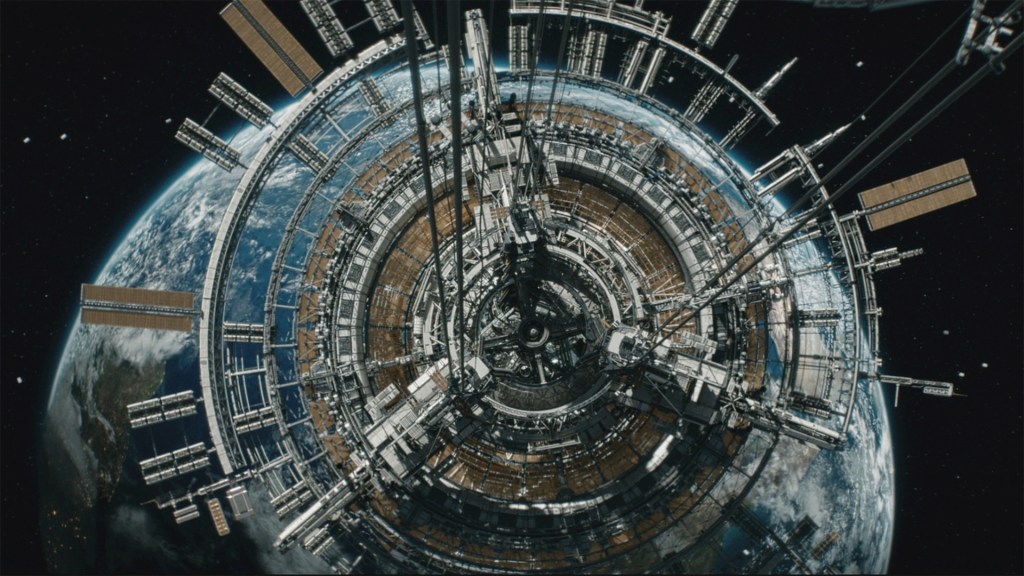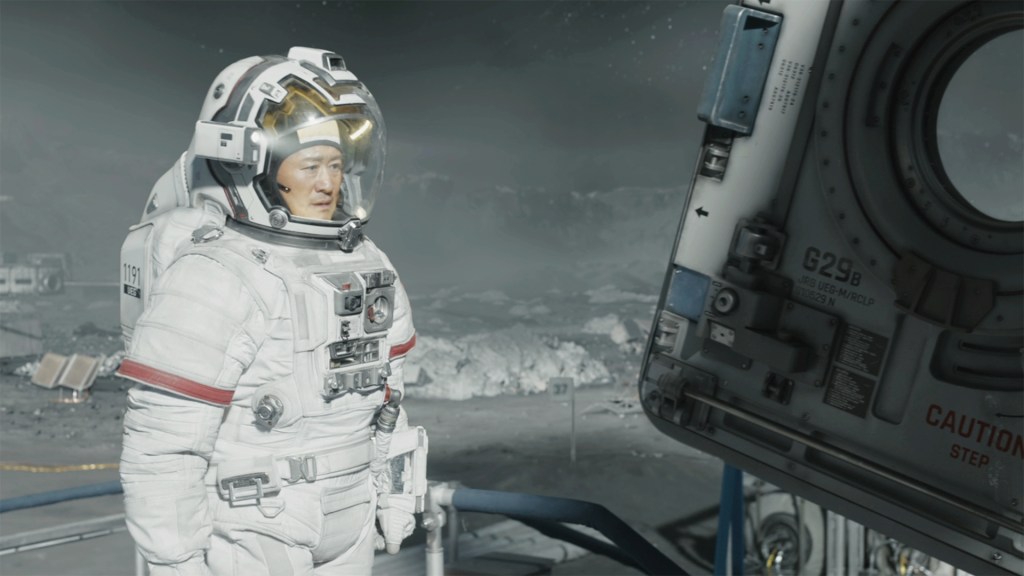Chinese film “The Wandering Earth II”, the prequel to “The Wandering Earth” (2019), attempts to provide an epic background story behind the previous film, and it accomplishes its ambitious mission to some degree. Throughout its 173-minute running time, the movie delivers one spectacular moment to another as you can expect from its futuristic setting, and that may be enough for you as long as you can overlook its sprawling narrative and bland characterization.
At the beginning, the movie quickly establishes how things become quite grim for the Earth as well as the humanity in the middle of the 21st century. For some unknown reason, the Sun starts to become an expanding red giant star which will engulf the Earth within at least 100 years, so every government around the world including the Chinese one sticks together as United Earth Government (UEG) for finding any possible solution for the survival of the humanity, and that eventually leads to the Moving Mountain Project. They embark on building huge rocket engines which will push the Earth away from its current orbit, and they hope that the success of this huge global project will eventually open the door for a much bigger project which will eventually enable the Earth and the humanity to escape from the solar system.
However, the Moving Mountain Project soon comes across several big setbacks right from the beginning. While it is surely hard and difficult to pull the joint efforts from many governments around the world, millions of people around the world become doubtful about the project while getting more interested in another big project which looks like a more tempting option for them. As shown from the opening scene in the film, there have been lots of research on transferring human consciousness to artificial intelligence computer, and there are even a group of terrorists ready to sabotage the Moving Mountain Project by any means necessary, just for swaying the public opinion more toward the “Digital Life Project”.
Nevertheless, the Chinese government, which is mainly represented by Zhou Zhezhi (Li Xuejian), remains unflappable as the main driving force behind the Moving Mountain Project – even after another devastating terror attack on the project. Zhou firmly believes that they must succeed at any cost within a short period of time, and, of course, his belief turns out to be right when the first trial of one of the prototype rocket engines shows enough success to generate more hope and support toward the project.
Meanwhile, we are also introduced to several other Chinese main characters in the story. We meet a young and confident UEG astronaut named Liu Peiqiang (Wu Jing), and the movie pays some attention to how he gets some respect and affection from one of his fellow UEG astronauts, who eventually becomes his wife later in the story. We are also introduced to a brilliant computer scientist named Tu Hengyu (Andy Lau), and this melancholic dude has lots of personal things to deal with after losing his family due to one tragic accident some time ago.
We already know how the story will end because of the previous film, but the screenplay by director Frant Gwo and co-producer Gong Ge’er keeps things rolling toward its predetermined ending at least. When the Moon becomes an unexpected big risk factor later in the story, the movie pulls all the stops for numerous visual spectacles as required, and we seldom get bored until the story eventually arrives at the climactic part where every main character in the story desperately races against the remaining time for saving the whole humanity from the total annihilation.
However, the movie often stumbles in case of character development just like its predecessor, and this weak aspect becomes all the more glaring during a number of heavy-handed melodramatic moments in the film. A subplot involved with Tu’s little daughter feels contrived to say the least, and the hidden intrigue surrounding Tu and his daughter is no more than a redundant footnote in the story in my inconsequential opinion. Furthermore, several other main Chinese main characters in the film are also not developed much on the whole as merely functioning as plot elements, and the same thing can be said about a bunch of of supporting characters including various foreign figures appearing here and there throughout the story.
Gwo is a competent filmmaker, and the diligent (and expensive) efforts from him and his crew members including cinematographer Michael Liu drew my attention from time to time when I watched the film early in the morning. For example, I enjoyed observing a bunch of huge elevator lines set between the Earth and the Moon, and I would not mind if the movie delved more into how this immense system works day by day. I must point out that the climactic part often feels quite overblown with lots of CGIs on the screen, but the result is fairly engaging and thrilling enough to hold your attention at least.
In conclusion, “The Wandering Earth II” has some impressive moments to be savored, but it is still less satisfying than the previous film as retaining many flaws instead of surpassing what is entertainingly presented in the previous film. Considering what is show at the end of “The Wandering Earth II, we will probably get the next film within a few years, and I sincerely hope that I will be more entertained in the next time.





![Lake Dillon and a Tree [In Explore] Lake Dillon and a Tree [In Explore]](https://live.staticflickr.com/65535/53731226172_4004cbfea4_s.jpg)




